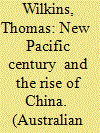|
|
|
Sort Order |
|
|
|
Items / Page
|
|
|
|
|
|
|
| Srl | Item |
| 1 |
ID:
098168


|
|
|
|
|
| Publication |
2010.
|
| Summary/Abstract |
This article analyses factors that cause China to have different approaches to different regional multilateral security institutions. Current research not only has little to say about China's motivation to participate, but also little regarding the level of its participation in or support for regional security institutions. To explain why China's post-cold war participation in regional multilateral security institutions varies, this article argues that threat levels help explain China's conditions for participating in multilateral security institutions, and security interests help explain China's behaviour as a member of such institutions. The author stresses that these are useful variables that can explain China's behaviour with respect to regional multilateral security institutions. In the foreseeable future, China's general posture toward regional multilateral security cooperation will be passive participation and strong support. Australia should not only consider strategies which emphasise strengthened bilateral relationships between Canberra and Beijing, but also continue to positively support regional multilateral security institutions.
|
|
|
|
|
|
|
|
|
|
|
|
|
|
|
|
| 2 |
ID:
098167


|
|
|
|
|
| Publication |
2010.
|
| Summary/Abstract |
The re-emergence of the 'Pacific Century', or 'Asia-Pacific Century', discourse centred on the rise of Chinese power raises important questions in the discipline of international relations (IR). These questions relate to the conceptualisation of the Pacific Century discourse, its application to the contemporary empirical case, and its relationship and amenability to IR theories. In order to address these questions, the article subjects the concept of a 'Pacific Century' to critical analysis through the synergy of three pertinent 'debates'. First, it creates a novel analytical framework to define and codify the parameters of the Pacific Century debate; a discourse that has until now remained diffuse and inchoate. Second, it engages with the present 'great debate' in IR between the traditional/rationalist and critical/reflectivist approaches, applying them in juxtaposition to the notion of a 'new' Pacific Century, led by China. Thirdly, then, the article speaks to the 'rising China' debate, which currently captivates commentators both in academic and policy-making circles. The article explores how the 'Pacific Century' concept is a compound of both ideational and material factors: it is at once both a political/ideological project and a reified intellectual frame of reference. Through this multidimensional analysis, the article aims to shape the re-emerging debate on the Pacific Century, affirm the enduring value of the term, and demonstrate the efficacy of IR theories in deconstructing conceptual problems.
|
|
|
|
|
|
|
|
|
|
|
|
|
|
|
|
| 3 |
ID:
098169


|
|
|
|
|
| Publication |
2010.
|
| Summary/Abstract |
It is widely recognised that the Responsibility to Protect (RtoP), adopted by heads of state and government in 2005, is an important new international principle. Australia has been one of the principle's most significant contributors, with prominent Australians and governments from both sides of politics contributing to its development, emergence, and implementation. This article traces and explains Australia's contribution to RtoP and asks what more it might do to assist in its implementation. It argues that Australia's commitment to RtoP is informed by a synergy of values and interests and has been strengthened by the Rudd government's reengagement with multilateralism. It concludes by calling for the development of a whole-of-government strategy for implementation and by suggesting some policy avenues that might be considered.
|
|
|
|
|
|
|
|
|
|
|
|
|
|
|
|
| 4 |
ID:
098170


|
|
|
|
|
| Publication |
2010.
|
| Summary/Abstract |
This article argues that, over the decades, Australians have held three different, coherent, long-lived 'visions' of nuclear weapons and strategy. Those visions-which we have labelled Menzian, Gortonian and disarmer-compete on four grounds: the role that nuclear weapons play in international order; the doctrine of deterrence; the importance of arms control; and the relevance of nuclear weapons to Australia's specific needs. We believe this 'textured' framework provides a richer, more satisfying, and more accurate understanding of Australian nuclear identity, both past and present, than previous scholarship has yielded. Moreover, the competition between the three visions might not be at an end. Changes in international norms, in proliferation rates, in regional strategic dynamics, or even in the deterrence doctrines of the major powers could easily reawaken some old, enduring debates. Australian nuclear identity faces an uncertain future.
|
|
|
|
|
|
|
|
|
|
|
|
|
|
|
|
|
|
|
|
|